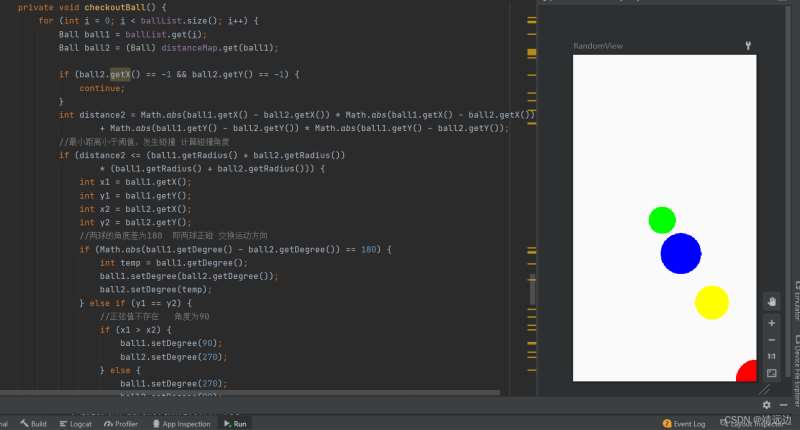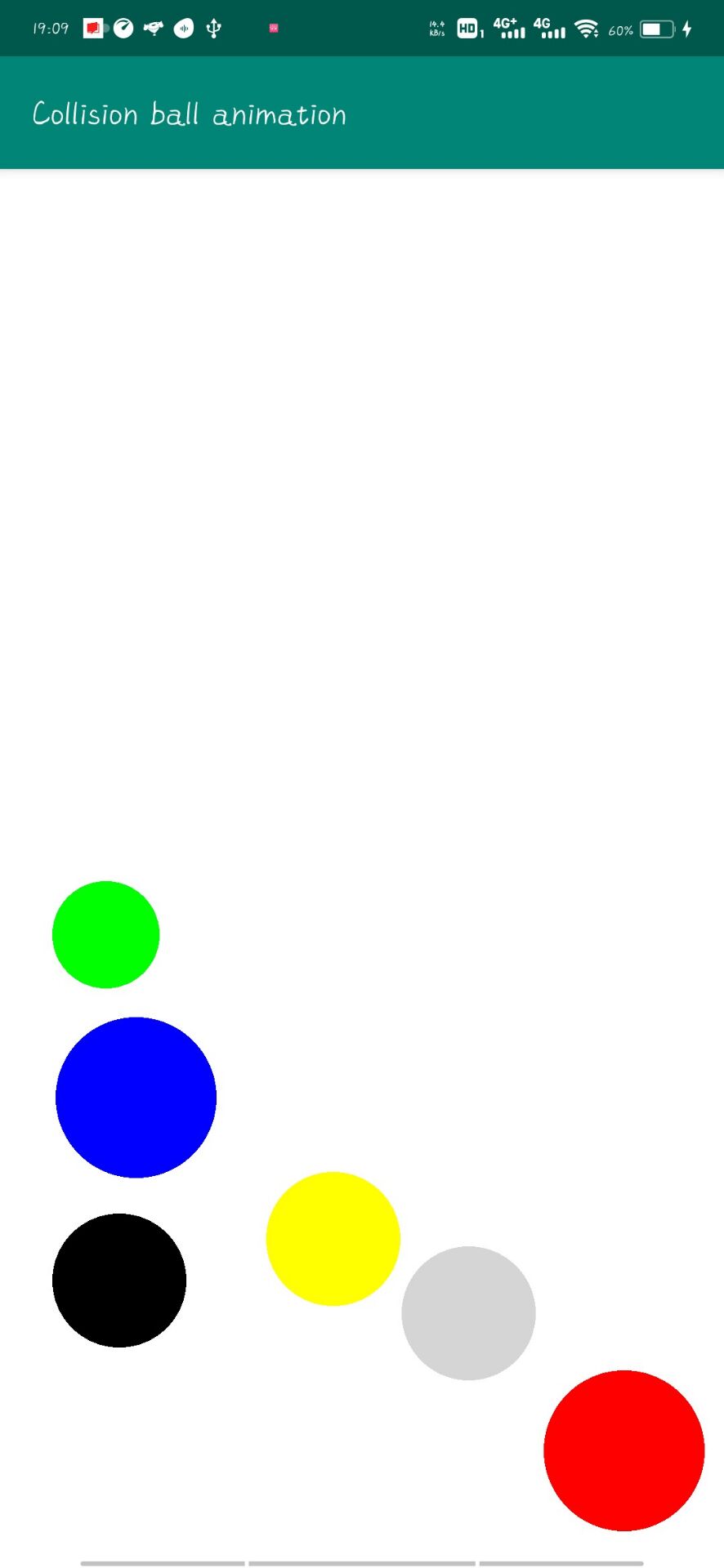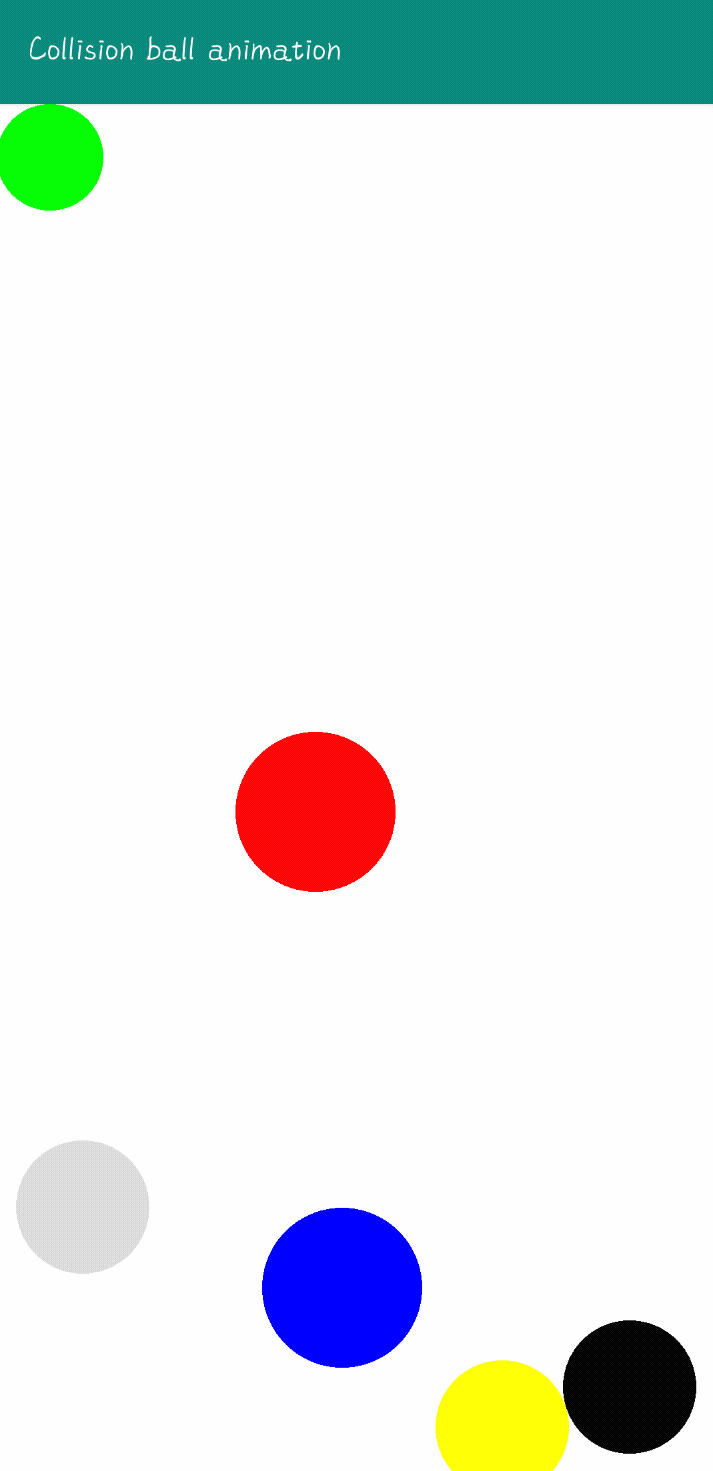Android之小球自由碰撞動畫示例
前言
本文將基於Android對一個小球自由碰撞動畫項目做一個簡單介紹,並展示部分關鍵代碼以及實際效果動態圖
1. add balls List
添加顏色為綠,黃,紅,黑,藍,灰的小球,並設置其大小
ballList.add(new Ball(80, Color.GREEN, 700, width / 2, height / 2));
ballList.add(new Ball(100, Color.YELLOW, 600, width / 4 * 3, height / 4 * 3));
ballList.add(new Ball(120, Color.RED, 800, width / 3 * 3, height / 3 * 3));
ballList.add(new Ball(100, Color.BLACK, 800, width / 3 * 4, height / 3 * 4));
ballList.add(new Ball(120, Color.BLUE, 800, width / 5 * 3, height / 5 * 3));
ballList.add(new Ball(100, Color.DKGRAY, 800, width / 4 * 5, height / 5 * 4));
2.ball parameter
int radius; //半徑大小
long speed =-1; //碰撞速度
int color; //顏色
long degree =-1; //初始方向值
int bgAlpha; //透明度
long lifeSpan =-1;
3. 判斷是否有發生碰撞的小球
關鍵代碼
private void checkoutBall() {
for (int i = 0; i < ballList.size(); i++) {
Ball ball1 = ballList.get(i);
Ball ball2 = (Ball) distanceMap.get(ball1);
if (ball2.getX() == -1 && ball2.getY() == -1) {
continue;
}
int distance2 = Math.abs(ball1.getX() - ball2.getX()) * Math.abs(ball1.getX() - ball2.getX())
+ Math.abs(ball1.getY() - ball2.getY()) * Math.abs(ball1.getY() - ball2.getY());
//最小距離小於閾值,發生碰撞 計算碰撞角度
if (distance2 <= (ball1.getRadius() + ball2.getRadius())
* (ball1.getRadius() + ball2.getRadius())) {
int x1 = ball1.getX();
int y1 = ball1.getY();
int x2 = ball2.getX();
int y2 = ball2.getY();
//兩球的角度差為180 即兩球正碰 交換運動方向
if (Math.abs(ball1.getDegree() - ball2.getDegree()) == 180) {
int temp = ball1.getDegree();
ball1.setDegree(ball2.getDegree());
ball2.setDegree(temp);
} else if (y1 == y2) {
//正弦值不存在 角度為90
if (x1 > x2) {
ball1.setDegree(90);
ball2.setDegree(270);
} else {
ball1.setDegree(270);
ball2.setDegree(90);
}
} else {
//斜碰 兩球圓心連接線的角度做反向運動
float tan = (x1 - x2) / (y1 - y2);
//正弦對應的角度在[-90,90] 在這取絕對值讓角度值為正值
int angle = (int) Math.abs(Math.atan(tan));
if (x1 > x2 && y1 > y2) {
//正弦值為正數 角度為[0,90] ball1在右下 ball2在左上
ball1.setDegree(angle + 90);
ball2.setDegree(angle + 270);
} else if (x1 > x2 && y1 < y2) {
//正弦值為負數 角度為[-90,0] ball1在右上 ball2在左下
ball1.setDegree(90 - angle);
ball2.setDegree(270 - angle);
} else if (x1 < x2 && y1 > y2) {
//正弦值為負數 角度為[-90,0] ball1在右下 ball2在左上
ball1.setDegree(270 - angle);
ball2.setDegree(90 - angle);
} else if (x1 < x2 && y1 < y2) {
//正弦值為正數 角度為[0,90] ball1在左上 ball2在右下
ball1.setDegree(angle + 270);
ball2.setDegree(angle + 90);
} else if (x1 == x1) {
//正弦值為0 angle為0
if (y1 > y2) {
ball1.setDegree(180);
ball2.setDegree(angle);
} else {
ball1.setDegree(angle);
ball2.setDegree(180);
}
}
}
//發生碰撞 重新初始化數據
distanceMap.put(ball2, new Ball());
distanceMap.put(ball1, new Ball());
}
}
}
1.collision detection

2.碰撞後重新調用onDraw(繪制小球)
private class MyThread extends Thread {
@Override
public void run() {
while (true) {
actionBall();
postInvalidate(); // 更新界面,重新調用onDraw()
try {
// sleep(1000 / 36);
sleep(10);
} catch (Exception e) {
e.printStackTrace();
}
}
}
}
onDraw
protected void onDraw(Canvas canvas) {
super.onDraw(canvas);
for (int i = 0; i < ballList.size(); i++) {
Ball ball = ballList.get(i);
Paint paint = new Paint();
paint.setColor(ball.getColor());
paint.setAlpha(ball.getAlpha());
paint.setStyle(Paint.Style.FILL);
paint.setStrokeWidth(1);
canvas.drawCircle(ball.getX(), ball.getY(), ball.getRadius(), paint);
}
}
4.application display
1.靜態界面

2.動態效果圖

到此這篇關於Android之小球自由碰撞動畫示例的文章就介紹到這瞭,更多相關Android小球自由碰撞動畫內容請搜索WalkonNet以前的文章或繼續瀏覽下面的相關文章希望大傢以後多多支持WalkonNet!